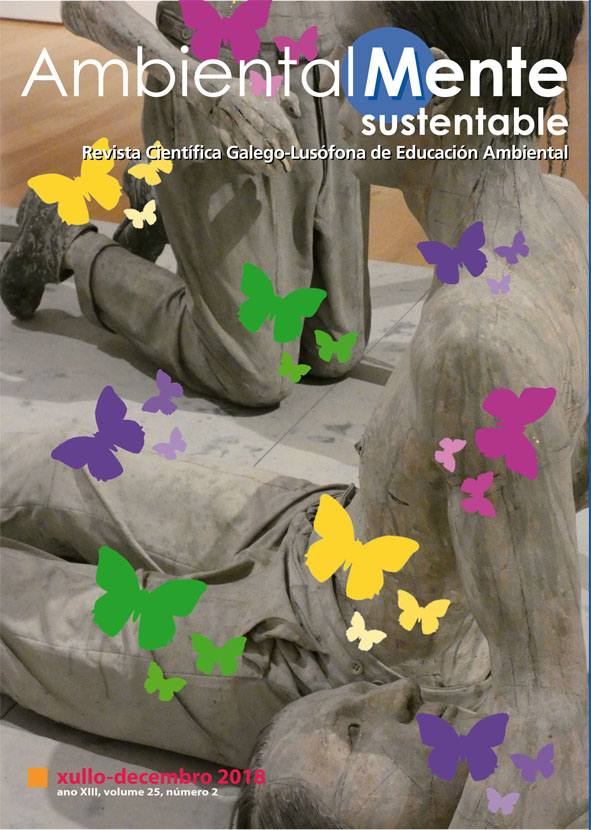O ecofeminismo na educación ambiental en España
DOI:
https://doi.org/10.17979/ams.2018.25.2.4968Palabras clave:
ecofeminismo, mulleres, educación ambiental, natureza, medio ambienteResumo
O artigo explora o papel dos movementos ecofeministas no desenvolvemento da Educación Ambiental, os seus antecedentes, a súa definición e ás mulleres españolas que representan este movemento.
Nos anos 70, coincidindo na época na que por primeira vez foi acuñado o termo Educación Ambiental, nace o movemento ecofeminista da man da francesa Françoise d’Eaubonne. Indagando na información das voces ecofeministas españolas, preténdese analizar as orixes e consecuencias do ecofeminismo na sociedade e a súa repercusión na historia da EA española.
Existen moitas mulleres que de forma activa levaron a cabo unha ardua loita pola protección do ambiente e da natureza e pola manifestación da importancia que tiña o medio natural no ámbito educativo. Un claro exemplo foron as irmáns Blanca e Clotilde Catalán ou Leonor Serrano Pablo e Gloria Giner de los Ríos. Na actualidade destacan as ecofeministas Alicia Puleo e Yayo Herrero.
##plugins.themes.default.displayStats.downloads##
Citas
Alonso, M. B. (2010). Historia de la Educación Ambiental. Madrid: Asociación Española de Educación Ambiental.
Calvo, S. e Gutiérrez, J. (2007). El espejismo de la educación ambiental. Madrid: Ediciones Morata.
Escuela In Natura. (Sen data). Escuelas Bosque en el mundo. [Recuperado de http://escuelainnatura.com/wp-content/uploads/2018/11/Escuelas-en-el-mundo2018.pdf].
Herrero, Y. (2013). Pautas ecofeministas para repensar el mundo. El desigual impacto de la crisis sobre las mujeres.
Boletín Ecos. (22). [Recuperado de: http://www.economiasolidaria.org/files/Pautas-ecofeministas-para-repensar-el-mundo_Y_HERRERO.pdf].
Kerslake, Y. L. (2013). Entrevista a Alicia Puleo: Reflexiones sobre el ecofeminismo. Feminismos. (22). 47-56. [Recuperado de: https://rua.ua.es/dspace/bitstream/10045/39791/1/Feminismos_22_04.pdf].
López, R. R. (2003). Educación Ambiental y su Didáctica. Lugo: Deputación Provincial de Lugo.
Macho, M. (24 de agosto do 2014) Anna Botsford Comstock, naturalista e ilustradora científica [Mensaxe nun blog]. [Recuperado de https://ztfnews.wordpress.com].
MAPAMA (1999). Libro Branco de la Educación Ambiental en España. Madrid: Ed. Ministerio de Medio Ambiente.
Pascual, R. M. e Herrero, L. Y. (2010). Ecofeminismo, una propuesta para repensar el presente y construír el futuro. Boletín ECOS, (10).
Puleo, A. (2015). El ecofeminismo y sus compañeros de ruta. Cinco claves para una relación positiva con el Ecologismo, el Ecosocialismo y el Decrecimiento. En A. Puleo. Ecología y género en diálogo interdisciplinar, páxs. 387-405. Madrid: Plaza y Valdés Editores.
Red Equo Mujeres. (2016). Manifiesto Ecofeminista de la Red Equo Mujeres. Madrid. [Recuperado de http://redequomujeres.es/manifiesto-ecofeminista-de-la-red-equo-mujeres/].
Ruiz, J. C. (2004). Mujeres al natural. 30 Diálogos sin aditivos, ni conservantes. Madrid: Mandala Ediciones.
Rubio, G. L. e Ruíz, C. X. (2017). El ecofeminismo entre las mujeres españolas. Relaciones Internacionales, 34. [Recuperado de https://hdl.handle.net/10486/677336].
Simón Alegre, A. I. (2013). Los inicios del ecofeminismo en España. Revista El Ecologista. (76). 54-57.
Descargas
Publicada
Número
Sección
Licenza
Os traballos publicados nesta revista están baixo unha licenza Creative Commons Recoñecemento-CompartirIgual 4.0 Internacional.
Permitese e anímase aos autores a difundir os artigos aceptados para a súa publicación nos sitios web persoais ou institucionais, antes e despois da súa publicación, sempre que se indique claramente que o traballo pertence a esta revista e se proporcionen os datos bibliográficos completos xunto co acceso ao documento.



